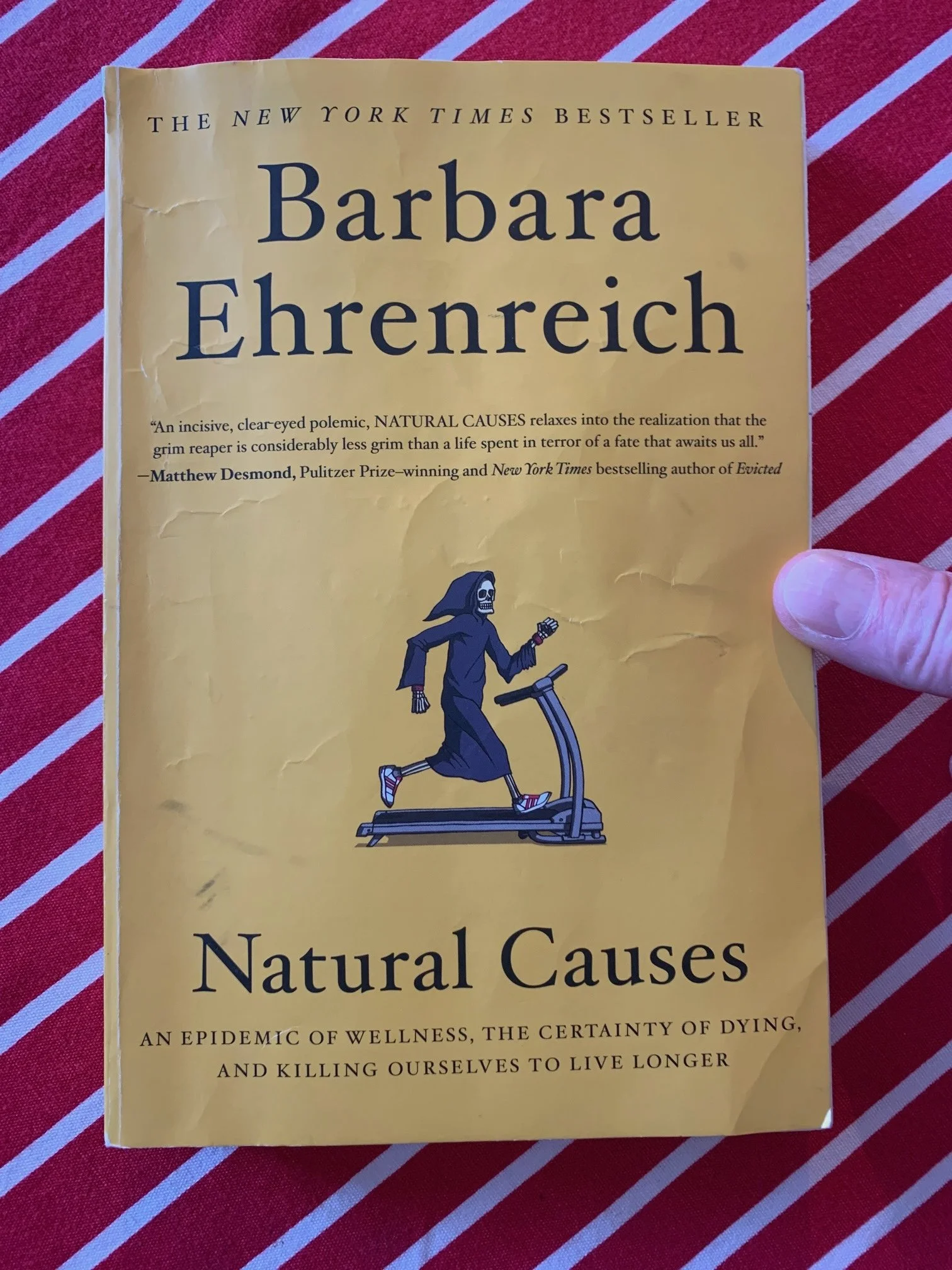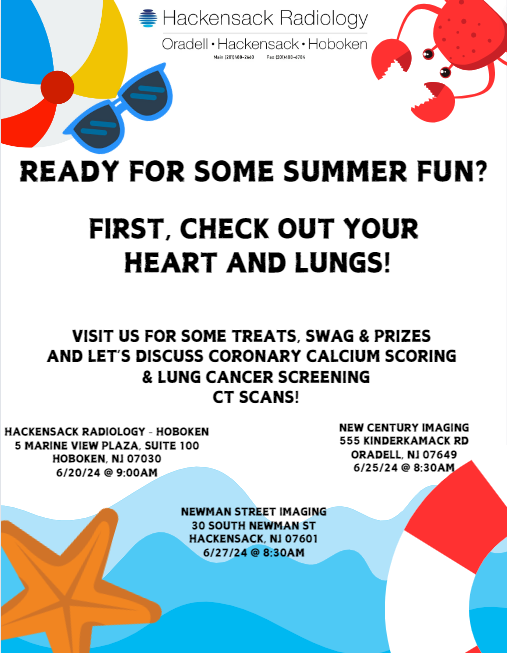I’m a Rational Anti-Medicine Nut
Barbara Ehrenreich argues in this bestseller that screening asymptomatic people for cancer and other diseases does more harm than good. I agree.
Hoboken, June 18, 2024. I recently ranted to my pal Theresa, a medical anthropologist, that a surgeon who carved a spot of melanoma out of my back was urging me to get screened for skin cancer every three months.
The hell with that, I told Theresa, from now on I’ll only see a doctor if there’s something wrong with me.
Theresa replied, Oh, Barbara Ehrenreich did that, and she wrote a great book about it.
So I read Natural Causes: An Epidemic of Wellness, The Uncertainty of Dying, and Killing Ourselves to Live Longer. Ehrenreich, who died in 2022 at the age of 81, was a tough investigative journalist and social-justice warrior. Her many books include Nickel and Dimed, a blockbuster exposé of minimum-wage jobs.
Ehrenreich, who earned a Ph.D. in cell biology from Rockefeller University, also wrote a lot about health care. Check out “Welcome to Cancerland,” her savagely funny 2001 account of her treatment for breast-cancer. Ehrenreich loathed being a patient, the indignity, the loss of control, the submission to authority, not to mention the physical discomfort. Ehrenreich must have been the most impatient patient ever.
In Natural Causes, published in 2018, Ehrenreich announces that she’s done with preventive medicine, at least the part aimed at detecting diseases before they produce symptoms. “I will seek help for an urgent problem,” she writes, “but I am no longer interested in looking for problems that remain undetectable to me.”
Ehrenreich reached this decision in her 70s, which she says is “old enough to die,” a remark to which I return below. Actually, her critique of preventive medicine applies to people of all ages, with a crucial caveat: preemptive tests make more sense for those with a family history of a disease or otherwise at risk.
Below I summarize Ehrenreich’s key points:
PROFITS TRUMP HEALTH: Preventive medicine transforms healthy people, as Ehrenreich puts it, into “raw material for a profit-hungry medical-industrial complex.” The basic assumption underpinning all her analyses is that American health care prioritizes profits over health.
That harsh charge, to my mind, is corroborated by two statistics: 1, the U.S. spends far more on health care per capita than any other country. 2, the U.S. has a lower life expectancy than many nations spending far less per capita. See this recent analysis of the problem. We Americans pay more and get less. That’s the very definition of a bad deal.
A radiology center down the street from me just emailed me this ad, which nicely illustrates what’s wrong with “preventive” medicine.
ANNUAL CHECKUPS ARE “WORTHLESS”: Ehrenreich cites a 2015 N.Y. Times essay in which health-care expert Ezekiel Emanuel calls annual checkups “basically worthless.” A 2019 meta-analysis by Cochrane Collaboration, a nonprofit that evaluates medical procedures, corroborates Emanuel’s assertion. Cochrane concludes that “health checks are unlikely to be beneficial and may lead to unnecessary tests and treatments.”
PELVIC EXAMS DON’T WORK: There is no evidence that pelvic exams, which Ehrenreich calls “humiliating, degrading and painful,” benefit asymptomatic women. A 2014 review by the American College of Physicians “recommends against performing screening pelvic examination in asymptomatic, non-pregnant, adult women.”
That review upholds the value of pap smears, which test women for cervical cancer. But a 2018 study concludes that pap smears and other tests for cervical cancer can lead to unnecessary treatment; the authors urge that the tests’ pros and cons “be reconsidered.”
MAMMOGRAMS DO MORE HARM THAN GOOD: Ehrenreich states that “repeated, huge, often international studies showed no significant decline in breast cancer mortality that could be attributed to routine mammographic screening.”
She adds that surgery, chemotherapy and radiation treatments for breast cancer “entail their own considerable risks.” Quite so. As I reported last year in “Mammography Screening Is a Failed Experiment,” there is growing evidence that screening kills more women than it saves.
COLONOSCOPIES DON’T SAVE LIVES: Ehrenreich is a master of one-liners, like this one: “If mammography seems like a refined sort of sadism, colonoscopies mimic an actual sexual assault.” Noting the dubious evidence for colonoscopies, she cites my 2012 Scientific American blog post, “Why I Won’t Get a Colonoscopy,” which argues that the risks of colonoscopies outweigh benefits.
Ehrenreich says I undercut my “well-reasoned” position by describing myself as an “anti-testing nut.” Calling myself a “nut” or “crank” is just my way of venting my compulsive self-doubt, and of alerting readers that my views diverge from the mainstream. As I reported last year, evidence keeps mounting that colonoscopies do not save lives.
DEADLY MEDICAL MISTAKES: Every time you get medical treatment, you run the risk of being harmed by side effects as well as mistakes. Ehrenreich quotes physician John Mandrola: “The best way to avoid medical errors is to avoid medical care.”
This risk isn’t trivial. A 2013 study estimate that as many as 440,000 “preventable hospital-caused deaths” occur in the U.S. every year. That number makes medical error the third leading cause of death in the U.S. behind heart disease and cancer.
A 2017 follow-up study arrived at a smaller estimate of 200,000 medical-error deaths a year. That number is still shamefully high, according to the study’s authors: “In what other industry would such a record be tolerated, let alone defended?”
Now back to Ehrenreich’s remark that in your 70s you are “old enough to die”. Death after a certain age is “natural,” she says, and we shouldn’t fight so hard to avoid it. She suggests that psychedelics can help us come to terms with mortality. Well, maybe.
Just to be clear: I’m not renouncing skin exams, colonoscopies and other preventive-medicine procedures because I’m ready to die. I’m renouncing them because I see no evidence that they will help me live a longer, healthier life; I’m more likely to be treated unnecessarily than to have my life extended.
I turn 71 this week. I expect, and hope, to live another decade or two. I’m dying to see what happens next in this crazy world. I do what I can to stay healthy. I don’t drink or smoke, and I exercise almost every day.
I haven’t renounced all preventive medicine. I got Covid and flu vaccines last fall because the CDC recommended them; I’m not mindlessly anti-authoritarian. I still wear a mask when I teach. That might sound nutty, but I haven’t had a cold—let alone Covid or flu--since I started masking four years ago.
In other words, I play the odds as I see them, based on my reading of the medical literature and my personal experience. Yeah, I’m an anti-medicine nut, but I’m rational.
Further Reading:
The Cancer Industry: Hype Versus Reality
Mammography Screening Is a Failed Experiment
Do Colonoscopies Really Save Lives?
We’re Too Scared of Skin Cancer



